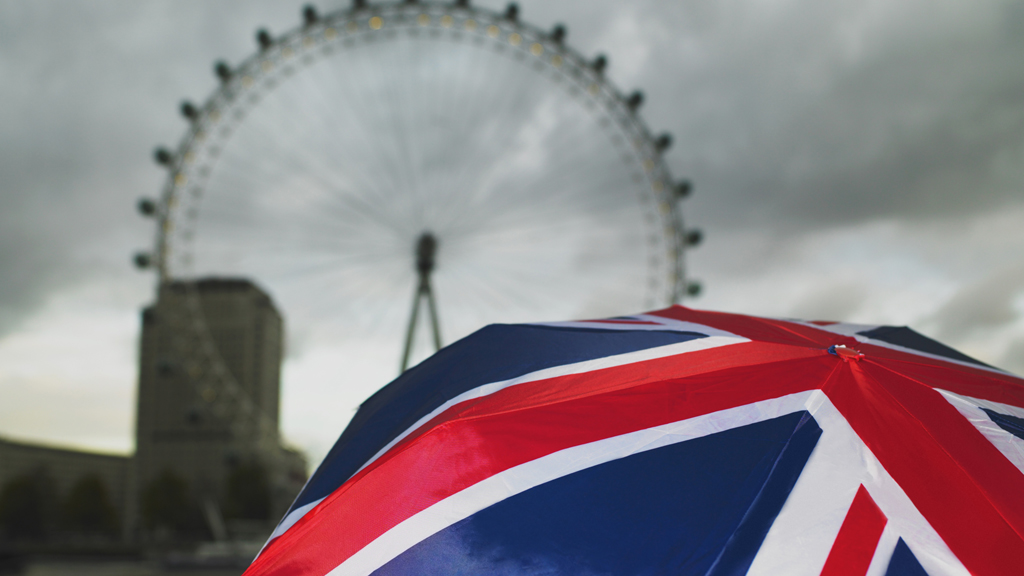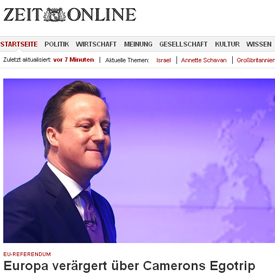Britain and Europe: an identity crisis?
In his speech on Europe, David Cameron says the UK is an island nation – argumentative, independent, strong-minded. But is that really a portrait of modern Britain?

At the heart of Prime Minister David Cameron’s speech on Europe today was a fundamental question: identity.
Whether in or out of the European Union, Britain has the character of an “island nation”, Mr Cameron said.
That’s why, he said, Britain comes at the EU with more of a practical, rather than an emotional, frame of mind – and why the idea of a referendum on Europe is acceptable in this country in a way it would not be to other continental nations.
“We have the character of an island nation – independent, forthright, passionate in defence of our sovereignty. We can no more change this British sensibility than we can drain the English Channel,” proclaimed Mr Cameron.
We can no more change this sensibility than we can drain the English Channel. Prime Minister David Cameron
But as John Donne said, no man is an island, and historian Professor Robert Colls, author of Identity of England, said that identity is actually an altogether more slippery character than this kind of rhetoric would suggest.
“It is absolutely problematic – this is identity we are talking about, not opinion or manifesto. If I asked you what your identity was, you’d have quite a job explaining it to me,” he told Channel 4 News.
In fact, he said the national British identity had struggled to define itself within the larger identity of Europe.
“Europe was clearly always about transnationalism, a tight union, federalism. Can the British think of themselves within this? Yes, but it won’t be the Britain their parents or grandparents knew. And they will have to have a lot more to do with German politicians than they ever thought they would,” he said.
Identity crisis?
This could be a trial for the “argumentative, and rather strong-minded” Britain of Mr Cameron’s speech.
Sunder Katwala, director of think tank British Future, said Britain had long struggled with the Europe question because the country had joined or stayed in the union at moments of weakness in its history – rather than for the other more positive political reasons of other nations.
“After Suez, Britain had to go and join the club – and joining it was an admission of decline and status. We chose to stay in 1975, which was not a confident moment for this country. We stayed because we couldn’t really afford to leave,” he said.
As such, Britain has never been comfortable within – but remains anxious about falling out, even after the national confidence booster of the Olympic Games and the Diamond Jubilee.
“There’s that idea of ‘game, set and match Britain’; that Europe is the place you go to compete and say you have won, not made a deal,” said Mr Katwala.
“With other European cultures, there’s the Borgen culture of compromise. With Britain, there’s always a risk of declaring Agincourt again,” he said.
Some feel that this attitude is troublemaking – with European politicians attacking the UK for “cherry-picking” and treating Europe like a “buffet”.
Amandine Jean, from the Ici Londres website for French people in London, said many French people felt this way.
“Britain is probably seen as a spoilt child, a bit capricious, being part of the EU but who would like to decide “a la carte” membership,” she told Channel 4 News.
However, others said there was an element of respect for Britain.
“Lots of people are thinking exactly like Cameron, but no one dares to come out and say it,” Thomas Kielinger, London correspondent for the German newspaper Die Welt, told Channel 4 News.
“That reflects the island nation characteristic – Britain is not afraid to tackle uncomfortable issues. Let Britain take the flak because it is so well-known for not minding being condemned for openness.
“I don’t think Cameron wants to be a troublemaker – it’s not about trouble. He’s speaking the truth. What Britain is saying is important for all of us – we need to reform.”

Will Britain go it alone?
But many counselled that for Britain to take this further and actually leave the EU was a different issue altogether.
“I don’t think Britain will leave the EU – but something dramatic will have to change,” said Mr Kielinger.
And Arnaud Vaissié, co-founder of International SOS and president of the French Chamber of Commerce in London, warned that letting Britain too far off the leash, like a naughty child, could be dangerous.
He told Channel 4 News the move towards a referendum was “totally incomprehensible” because it would mean that Britain actually became the loner that it believes itself to be – which would lead to the nation automatically losing influence and relevance.
“Why re-open the debate when it has already, frankly, been dealt with in favour of the UK as far as continental Europe is concerned?” he asked.
In fact, he had a warning for Mr Cameron – because while the prime minister said the English Channel cannot be drained, Mr Vaissié believes instead something else could happen, which he says would be more damaging to both the UK and the EU.
“If the UK opts out, actually, it will be enlarging the channel,” he warned.





